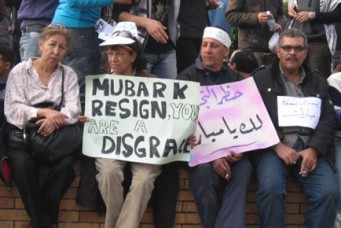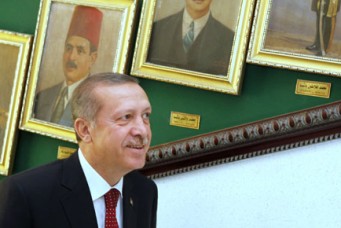Egypt Navigates its Investment Future
Foreign investment helps attract wealth to underdeveloped nations, but the arbitration rules are often agreed within a global paradigm steeped in colonialist history.

The Egyptian Exchange bell is seen at the stock exchange in Cairo, April 28, 2015. Mohamed Abd El Ghany/Reuters
Investment arbitration is the process by which disputes between parties are resolved, in private, without the use of a national court of law. Laws governing investment arbitration are meant to incentivize and provide security to foreign investors, protecting them from expropriation—when a state seizes a foreign investor’s property—and unfair treatment. Currently, Egypt is governed by pro-investment laws passed from 1968 to, most recently, Investment Law No. 72 in 2017.
The Middle East and North Africa region accounts for just 11 percent of the caseload of the International Center for Settlement of Investment Disputes (ICSID), an international dispute-settlement institution which provides voluntary arbitration services. Notably, the number of arbitration cases filed against Egypt before ICSID is the largest among both Arab and African countries. By the end of 2017, thirty arbitration cases had been filed against Egypt, twenty-two of which have been resolved.
A Brief History of Development
“I believe that the context in which investment arbitration takes place is one of neocolonial imposition of neoliberal economic and political policies on the underdeveloped states, including Egypt,” Jason Beckett, Assistant Professor in the Department of Law, said, opening the “Legal Challenges and Opportunities with a Focus on Egypt” webinar hosted by the School of Global Affairs and Public Policy.
Beckett argued that both the pre- and post-World War II global paradigms were ones of colonialism and empire, despite popular assertions that the post-World War II order shifted in favor of international law and relations. Following a period of colonial struggles in the 1950s-70s, formerly-colonized countries “embarked on successful developmentalist policies that boosted both their economies and the living standards of their people,” Beckett said. Then, from 1981-83, the global financial crisis nearly bankrupted most developing states, who were forced to refinance their loans through the International Monetary Fund (IMF), and then the World Bank.
These loans imposed conditions far beyond repayment. Known as structural adjustment programs (SAPs), these conditions, imposed under duress, required a restructuring of macroeconomic policy. “What we saw at that moment was the beginnings of a new colonial movement to reduce the policy space of underdeveloped states…under the particular pursuit of neoliberal economic and political restructuring,” Beckett asserted. Neoliberalism is, in fact, not a failure, but a development project “sham” meant to maintain and disguise the neocolonial economic order, which benefits the overdeveloped world at the expense of the underdeveloped world.
Arbitration in Egypt
Ramy Bassily, a lawyer specializing in investment and commercial international arbitration and an AUC alum, draws a connection between the formation of the European Union, an economic-cooperation-turned-political-union, which today encompasses twenty-seven nations following World War II, and Egyptian policies following the January 25 uprising. Financially, the impact of the uprising manifested as an increase in investment-related arbitrations brought by foreign investors under bilateral investment treaties (BITs); the majority of the cases brought against Egypt have occurred since 2011.
“Here, [Egypt] starts to make the link between politics and economics,” he said. The country was unstable politically, which negatively affected the economy, and thus, Egypt began work to restore political stability. Turning to the IMF, Egypt was awarded a three-year extended arrangement under the Extended Fund Facility (EFF) in 2016 worth approximately $2.75 billion. Despite the conditionalities mentioned above, the Egyptian government invested in projects, such as infrastructure, accruing money indirectly through salaries, tax revenues, and investment opportunities. “It was a kind of a marketing for foreign investors to come and invest in Egypt, saying that ‘Ok, Egypt is to be an investment hub in the region,’” Bassily said. The 2017 Investment Law No. 72 was also passed to help Egypt meet obligations agreed to under the IMF loan.
Apart from investment laws, Egypt is party to around one hundred bilateral investment treaties, seventy of which are enforced. Under these treaties, the state pledges to protect foreign investors against violations, namely illegal expropriation and unjust treatment. Egypt faces two dilemmas, Bassily said: attracting new investors with the new laws adopted and managing existing investors who were negatively affected by the laws. When investment laws change, previous investment analysis is rendered useless as expected returns are no longer the same, which can frustrate existing and deter future investors. Additionally, sometimes regulations are not implemented in proper accordance with the law, he stated.
If investors find their rights, as stipulated under investment legislation, violated, they may object and seek arbitration as a means to resolve the dispute. Founding Dean of the School of Global Affairs and Public Policy, Nabil Fahmy agreed that experience with international investment arbitration would have benefitted Egypt and likely would have prevented mistakes in the drafting of investment treaties. However, “to the favor of the government, it made a mistake, and it made up for the mistake,” he said. “But a contract is what binds two sides, so lack of expertise is not an excuse.” While most investment arbitration proceedings brought against Egypt are oriented towards a BIT and/or an investment law, other challenges to Egypt’s investment environment include: political instability, bureaucracy, incompetence, and corruption.
Reforms?
Bassily finds reforming bilateral investment treaties politically challenging. For example, “[the U.S.] will say ‘take or leave it, that is what we offer’ and you need those bilateral investment treaties because those American investors, who think about investing in Egypt, will reconsider their decision if they are not protected by an investment treaty,” Fahmy argued.
To obtain feasible reforms, Bassily recommends having specialized experts review the treaties before they are concluded and easing the transition between changes in investment laws. Specifically, new Egyptian laws could include a ten-year transition period in implementing new regulations in an effort to accommodate existing investors, he said.
Additionally, the cultural context of arbitration matters. The private sector client is not likely to want to be party to an arbitration solely in the context of the local project country, Fahmy noted. “The culture and the context tends to be distorted,” he said. Fahmy suggested a regional arbitration with a MENA or African court bringing a greater understanding of the region’s complexity. Further emphasizing cultural context, Fahmy highlighted a comparison with the United States Supreme Court. “If you look today at the debate in the American Supreme Court, between the conservatives and the more progressive, it’s the same law,” he said. “There’s clearly a tendency to interpret the law in a conservative fashion by some and a more progessive fashion by others. The issue of interpretation is as important as the law itself.” Worldwide, cultural context affects the implementation of legislation.
The International Centre for Settlement of Investment Disputes (ICSID), an arm of the World Bank established by the Washington Convention in 1965, is the “most important” institution managing investment cases, according to Bassily. It is “the world’s leading institution devoted to international investment dispute settlement”, according to the center’s website. However, a 2015 book argues the legitimacy of the ICSID is challenged by a need to diversify its panel of arbitrators, a lack of accessibility to underdeveloped nations, and a lack of cooperation with member states in enforcing resolutions. Twenty ICSID cases against Egypt have been finalized—eight have been discontinued and settled with the investor and twelve have been decided; of these twelve, eight ICSID cases have concluded in favor of the state and four have favored the investor.
There have been scattered attempts at alternative institutions, but they were unsuccessful on the ground. “There are many bilateral investment treaties that are already enforced. Why would an investor go to a new institution or entity when they already have something that is constructed in terms of institutions?” Bassily answered.
Looking Forward
During COP26, the United Nations 2021 climate conference, international attention was focused on the leaders gathered in Glasgow and updates to nationally determined contributions (NDCs) established by the 2015 Paris Agreement. If, in the aftermath of the conference, countries wanted to increase environmental regulation, by closing coal-fired power plants or imposing extra costs for environmental damage, they would potentially be able to launch a claim for indirect expropriation—when a state takes effective control of an investment, depreciating its economic value. While the possibility is there, the state is not assured legal victory, Bassily said.
International investment arbitration is largely unknown, but it is important for people to know it exists, Beckett said. “It has a really material impact on states, especially in the developing world, and I’d say, at times, they have been chronically unprepared for that impact,” he argued. Investment, and corresponding dispute resolution measures, can affect development pace and equity, and by extension, the livelihoods of citizens across the developing world. “This is a topic that should be on university syllabi, should be the subject of advanced study and research, especially [in Egypt] and in other underdeveloped states,” Beckett finished.




